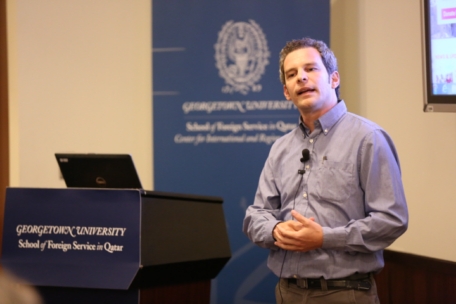Dialogue Series, Distingushed Lectures, Regional Studies
Micha Kurz on “Mobilizing Communities in Occupied Jerusalem”

Micha Kurz, a co-founder of “Grassroots Jerusalem,” delivered a CIRSMonthly Dialogue lecture on “Mobilizing Communities in Occupied Jerusalem” on November 12, 2013. Kurz works to support a Palestinian platform for community-based advocacy in Jerusalem, putting Jerusalem back on the international map as a Palestinian capital. His lecture focused on the high degree of misinformation regarding the political realities experienced by the increasingly segregated Palestinian communities on the ground. Issues of escalating Palestinian impoverishment are often marginalized, and the daily suffering sanitized, under the Israeli political narrative of “security and peace.” Even though Israelis and Palestinians share some of the same physical spaces in the city, their experiences could not be more dissimilar causing ongoing conflict and tension.
In order to understand the history of Jerusalem, Kurz said, it is important to understand the bifurcated histories of conflict. For Israelis, the modern historical understanding of the tensions starts in 1967 and the discussions of a “two-state solution,” but for Palestinians this begins much earlier in 1948 with the Naqba, or catastrophe. In Israeli schools, teaching a history of the Naqba is practically an illegal topic, Kurz argued. Thus, many Israelis as well as communities in the West do not have, nor often care to have, a full picture of what is happening on the ground.
If one goes back further in time, before there were divisions between Israelis and Palestinians, there was a Jerusalem that was populated by Jews, Muslims, and Christians, Kurz said. Jerusalem was a central city in the region connecting the cities of Bethlehem, Hebron, and Be’ar Saba’a in the South, to Nablus, Nazareth, and Tiberius in the North. The city also connected Jericho from the East, through the oldest trade route in the world, to the port of Jaffa and the Mediterranean sea in the West. The city wasn’t just a spiritual or religious capital; it was also an economic capital in the region. But Israel has detached the city from its suburbs and the West Bank, isolating Jerusalem, and treating it as if it were a city in Europe, not a capital in the Middle East.
In an attempt to control demographics, for the last four decades, Israeli government policy has been to keep Palestinian parts of the city underdeveloped, while expanding mass Israeli settlement housing projects—illegally according to international law. While Israeli settlement grew on stolen Palestinian farmlands during the 1970s and 80s, without the freedom to develop their own neighborhoods, young Palestinian families had no choice but to move out of town, and to live in the suburbs. Later, in the 1990s during what was described as “a step toward Peace,” checkpoints were constructed limiting Palestinian access to the Central Business District and with it access to the main market, employment, healthcare, and education. Palestinians who were caught at checkpoints or Israeli military house-raids and designated as not living within the Israeli-defined borders of the city have had their “residency” status revoked. These no longer have the right to visit their hometown without an Israeli issued permit. Israel finally severed Jerusalem from its age-old suburbs with the construction of the “separation wall.” The “wall” was built during the period known as “the Bush War on Terror,” and its presence has often been justified under the rubric of “security.” However, it has been widely proven by many Israeli sources that this is not the case, and the “wall” has benefited the Israeli economy by segregating Palestinian cities from one another.
Today, the Israeli government does not allow the Palestinian Authority jurisdiction in Jerusalem. Without the right to vote in proper government elections, Palestinian Residents of Jerusalem have not been politically represented for the last four decades. Kurz discussed the divisions and segregations that have occurred; Palestinians living in the suburbs of the city are physically isolated and segregated from their communities and from basic amenities. As a result, over 5,000 businesses have shut down over the past decade, bringing unemployment, poverty, and rising tensions to peak levels. The age-old character has been cleansed from Jerusalem together with its Palestinian residents.
Kurz lamented how “Israel has over time gained control of the land between the Jordan River and the Mediterranean sea, including the economy, resources, and the peoples living in it.” He added later, “I find it difficult to describe Israel either as a democracy or a Jewish state.” In conclusion, Kurz questioned how “Many people around the world still discuss a Two-State Solution, expecting ‘Peace, Dialogue, and Coexistence,’ where I feel we ought to be discussing human rights, justice, and leading practical conversations about freedom of movement and development in an important regional capital.”
Micha Kurz was born and raised in Jerusalem. During the second Intifada he learned about the Israeli Occupation of Palestinian land and people first hand as an Israeli soldier. In 2004, he was a co-founder of “Breaking the Silence” and has since focused his work in Al Quds-Jerusalem, “a forgotten epicenter of the occupation. “Grassroots Jerusalem” has recently opened the doors to Al Marsa (the Harbor), a Political Community Center and Legal Clinic built to counter the threat on freedom of speech and assembly in Jerusalem today.